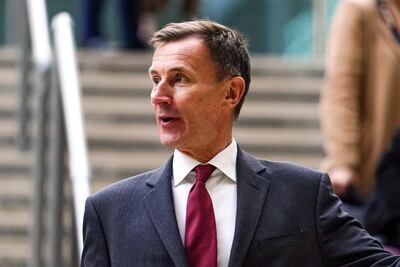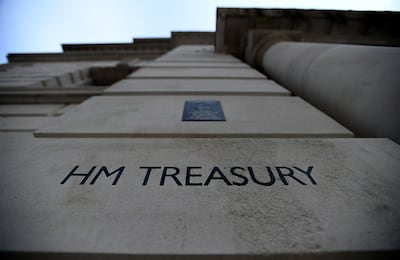British Finance Minister Jeremy Hunt has been given a surprise surplus after millions paid their tax receipts in January. This comes ahead of the annual budget announcement expected next month.
This record figure of self-assessment income tax receipts hit £21.9 billion ($26.5 billion), the highest January figure since monthly records began, and £5.5 billion more than last year.
The stronger-than-anticipated public finances has given the UK’s Chancellor of the Exchequer up to £30 billion for short-term giveaways.
Ruth Gregory, deputy chief UK economist at consultancy Capital Economics, said: “This suggests that the Chancellor will have some wiggle-room in the budget to fund near-term tax cuts and/or spending rises.”
Mr Hunt said in response to the data “getting debt down will require some tough choices, but it is crucial to reduce the amount spent on debt interest so we can protect our public services”.
UK's borrowing increased over the year due to support schemes for coping with high energy bills. The government aims to reduce the debt in the medium term despite current spending to support households and businesses.

The UK government spent more than £10 billion on its energy support for households in January, while it also paid £2.3 billion to the European Union to settle a dispute over customs duties.
The government has borrowed almost £31 billion less than its forecast for 2022/23.
The better-than-expected backdrop for the public finances may fuel tensions between Mr Hunt and lawmakers in the ruling Conservative Party who want Mr Hunt to cut taxes to help struggling families, revive the economy and boost their electoral fortunes.
KPMG UK economist Michal Stelmach said that the surplus budget “could tempt the chancellor to offer a pay increase to public sector workers, hoping to prevent another wave of strikes”.

Isabel Stockton, a senior research economist at the Institute for Fiscal Studies, said the “good news for the chancellor is that we can expect lower-than-expected spending on debt interest to persist, and the cost of the expensive energy support schemes also to end up lower than forecast. The latter will represent a short-term saving for the exchequer”.
The chancellor has ruled out significant tax cuts and refused to bow to union demands on pay. He insists his priority is delivering on a government pledge to cut inflation in half this year.
The British Finance Minister said: “With debt at the highest level since the 1960s, it is vital we stick to our plan to reduce debt over the medium-term”. He added: “Getting debt down will require some tough choices, but it is crucial to reduce the amount spent on debt interest so we can protect our public services.”


